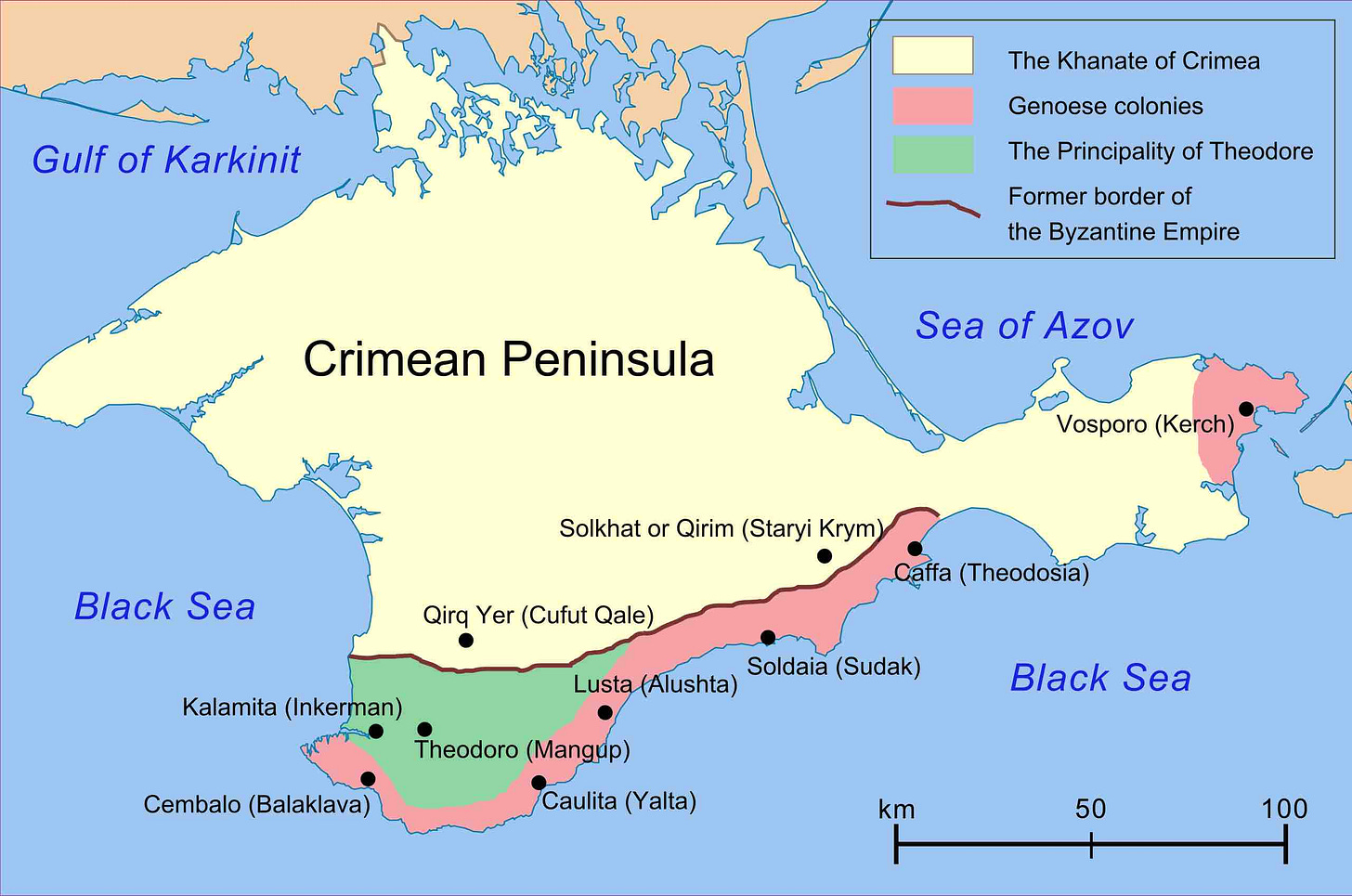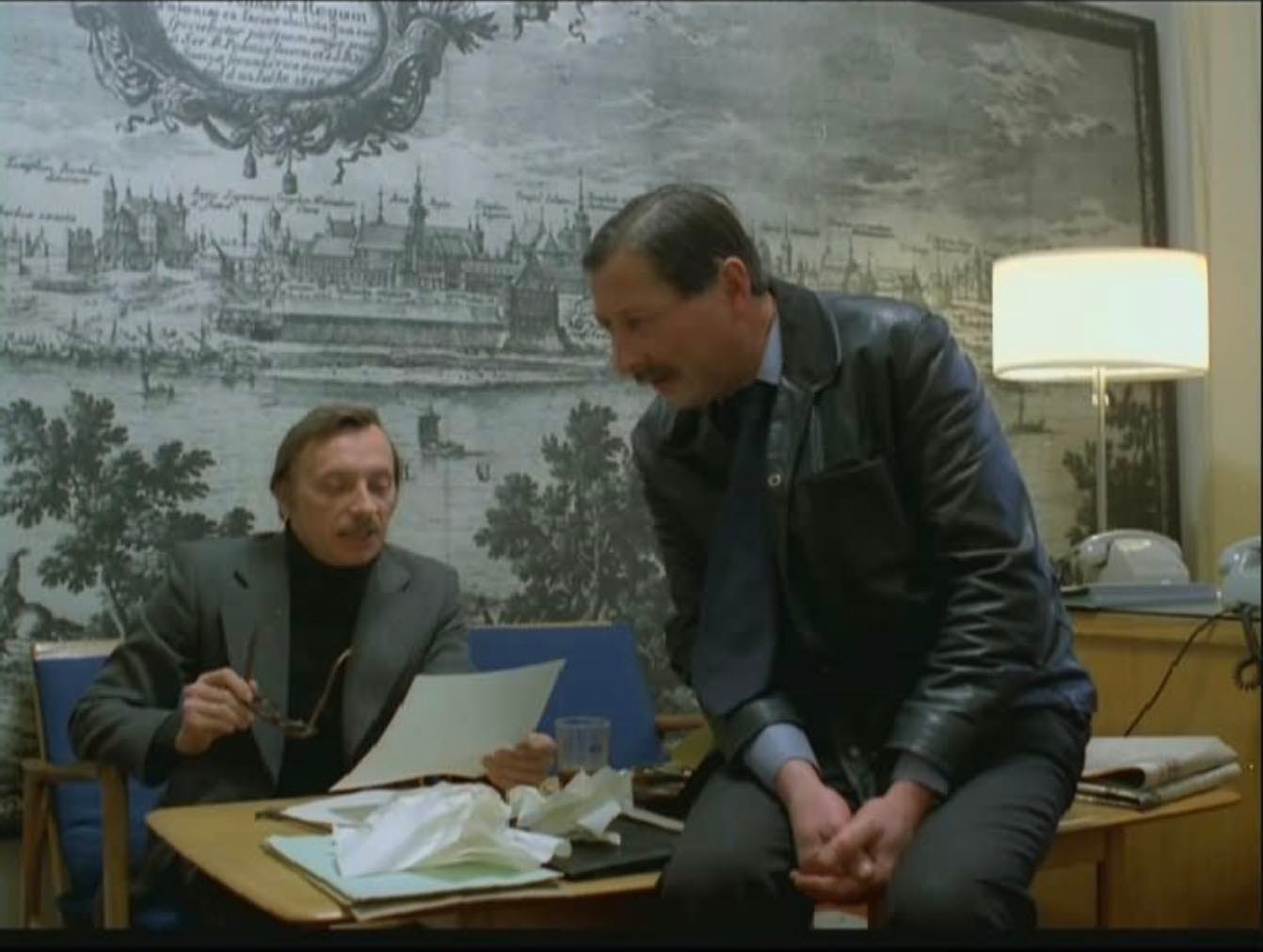Whose Crimea?
Let's be realistic: just how much time do you give to the Kerch bridge?
A year ago, Elon Musk proposed insanely stupid “peace plan”. Now we know that his “source of information” was Russian embassy - that explains a lot (via Twitter)
If you are reading this, you must be following the war pretty closely, so I assume you already have a basic knowledge of Crimean history. You know that it was captured by Russia from the Ottoman Empire in 1783 and then transferred to Ukraine in 1954 by Khrustschev.
Current Russian propaganda is portraying this transfer as something sinister, erroneous, controversial, or even illegal (as if the decision of the party leaders could ever be illegal in a communist country!). This is a new phenomenon caused by looking for justification of the war - there was no controversy about it as far back as 10 years ago.
This decision was simply pragmatic. Crimea is mostly barren rock, almost everything (food, gas, electricity, water, consumer goods) has to be delivered from the mainland.
The shortest route leads to Kherson. So it is only natural for Crimea to be in the same administrative unit as Kherson - otherwise there would always be issues such as “Kherson power grid authority refuses to allocate more gigawatts to Crimea”.
For centuries, the economy of Crimea was based on being the southern terminus of the Dnipro trail, “from Varangians to the Greeks”, that is: from Scandinavia to Byzantium. Kyvian Rus was described in the earliest chronicles as the country stretched along this route. The economy of Crimea makes no sense if it’s separated from Dnipro.
That’s why the Elon Musk peace plan is so insanely stupid. It’s not only about the water, Crimea depends on external supplies. Since no matter how this all ends, Russia and Ukraine are unlikely to become friends in the foreseeable future, the issue of “supplies from the mainland” would be inevitably divisive.
Sooner or later Russia would demand an extraterritorial corridor. As we know from history, such demands usually lead to new war. There will be no lasting peace with Crimea and Kherson separated by state border.
So in the perfect world, who should get Crimea? Here in Eastern Europe we hate the history-based argument like “Russian since 1783”, because you can invalidate each and every country of this region.
Remember: all our countries had a long period of “being absent from the map”. Russia snatched Finland in 1809, Georgia in 1801, Azerbaijan in 1828, Moldova in 1812, Latvia in 1772, Estonia in 1710 and large part of Poland in 1795. By Elon Musk’s logic, all these countries should not exist as well.
It’s not surprising given that his source of “knowledge” is Russian embassy. And Putin made it clear in his speech opening the invasion, that his long-term intention is restoration of the tzars empire (“undoing the Bolshevik mistake of letting them go”).
This is actually telling that from the Arctic to the Caucasus, all these nations took the first opportunity to shake off Russian rule in 1917-1922. This is rare, the only similar example in the West I can think of is Ireland.
If I’m to design the perfect world of my dreams, I would give Crimea to the Crimean Tatars, who ruled the peninsula for much longer than Russia. The Crimean Khanate was the most successful splinter state of the Golden Horde and it existed from 1441 to 1783.
Before the Tatars, Crimea was inhabited by various lost civilisations (Goths, Scythians, Khazars), then colonized by the Greeks and the Romans. If you feel that Crimean toponomics often sound like they are derived from Greek or Latin (Theodosia, Eupatoria, Taurida) it’s because they are.
Map of pre-Tatar Crimea, by Amitchell. CC BY SA 3.0, via Wikipedia.
Crimea was a location of the last Gothic state - Principality of Theodoro (existing until 1475), and an early corporate state, a colony owned by aGenoese bank and controlled by Jewish family Ghisolfi (existing until 1483). In 15. century Antiquity, Middle Ages and Renaissance co-existed (with a splash of cyberpunk: come on, a corporation with its own navy, army and territory!), resulting in mind-blowing ethnical & religious diversity.
The Tatar rule largely preserved it. I don’t want to sound like I’m idealising them. Khanate was no democracy, of course. But these various communities could exist fairly well protected by the millet system - if they paid taxes and were generally loyal to the Khan, they enjoyed considerable autonomy.
Instead of listing all these communities, I will focus on one of them in particular. For some reason, I was always mostly interested in the Crimean Karaites.
Unlike mainstream (Rabbinic) Jews, Karaites reject Talmud and Midrash, they believe only in the sanctity of the Torah. This approach never caught much traction in the Jewish world, so Karaites for most of their history were a minority within a minority.
They found a safe haven in Crimea for centuries. Since the Polish-Lithuanian Commonwealth was usually on good terms with Crimean Khanate, some of them moved to Poland, where they contributed greatly to Polish science and culture.
The most famous Polish Karaite is probably Eugeniusz Robaczewski, a voice actor. He developed a scenic voice that sounded vaguely unpleasant, so you assume his character must be evil even when he appears to be nice. For a whole generation in Poland, he is the voice of various Scooby-Doo villains and Scrooge McQuack from the “Duck Tales”.
He rarely played in live action cinema, however he did have an important role in one of the most important comedies of the communist era: “Miś”. He plays a mysterious unnamed character who appears to write songs for a living, but he is surprisingly well informed and well connected. It seems that his second source of income is the communist secret police. Of course, it could not have been openly shown in the movie: it is mostly implied by his sinister voice (and the odd fashion choices, such as leather jacket and a necktie).
Eugeniusz Robaczewski (right), the most famous Karaite in Poland. Still from “Miś” (1981) by Stanisław Bareja.
This comedy is so important in Poland it could be used as a test for genuine Polishness. “Don’t shoot, I’m Polish!” “Oh yeah? Sing the song the Songwriter is writing in <<Miś>>!” (that’s a tricky one: he’s writing two of them, so the correct answer is “which one?”; who knows, maybe it will save your live some day).
I’m focusing on Karaites because a typical depiction of Crimean diversity just lists the various groups living there as “Jews, Muslims, Christians”, etc. It was even more complex than this.
It’s not enough to say that Jews were living there. What kind of Jews? Ashkenazim? Sephardim? Mizrahim? They all did!
Same goes for Muslims. But what ethnicity? Turkish? Arabic? Caucasian? Catholics? But do you mean Roman Catholic or Greek Catholic? Orthodox? But which autocephaly, Greek Orthodox, Eastern Orthodox or Oriental Orthodox? All these communities coexisted with Tatar rule for centuries.
Hitler and Stalin were united in destroying diversity. Their ideas of Gleichschaltung were slightly different, but in both cases it boiled down to the same thing: geno- and ethnocide. Murder and deportations.
Crimea emerged severely depopulated from their monstrous crimes. That’s another reason for Khruschev's decision: connecting the peninsula to the much bigger neighbour just made it easier for the people to move there.
I would dream of Crimea being diverse again. In practice, this is possible only in a democratic country protected by EU-level human rights.
Russian society is based on racism. While racism in the West is at least mitigated by law and what Elon Musk would call “political correctness” and “woke mind virus”, Russians are pretty open about their racism (as I wrote before). They just don’t know any other “diversity” than “Tuvan, Tajik, Kalmuks etc. enslaved by their Moscow- and Petersburg based overlords”.
You should also bear in mind that the Russian naval base in Sevastopol was de facto extraterritorial in independent Ukraine (it was guaranteed by bilateral treaties). People working for the Russian Navy usually had no Ukrainian passports. That’s why it was so easy for Girkin’s thugs to seize power in 2014 - they arrived from Moscow without border controls and changed to combat gear in the extraterritorial base.
Sevastopol will no longer have its special status after the war. If Russia wins: it will not need it. If Ukraine wins: they will not allow it.
In August 2022, first Ukrainian airstrikes on Crimea commenced, resulting in exodus of Russian holidaymakers. One video of a crying Russian woman went viral. From her monologue it seems she has no idea what is going on (still from video posted on Twitter)
The decision obviously belongs to Ukraine and Ukraine alone. But if they say “Russian occupiers and collaborators should leave Crimea”, I would say: that’s only fair. It was the same in the democratic West after 1945 - in France alone, 46000 people were punished by law for collaboration with the Germans.
Personally, if I was a Russian citizen in Crimea, I would leave before it’s too late. Be realistic: how many months do you give to the Kerch bridge?






The southern shore of Crimea was ruled directly by the Ottomans (not the vassalized Khanate), and most of the diversity was there (with similar policies, so that doesn't change the conclusions, I'm just nitpicking).
"Current Russian propaganda is portraying this transfer as something sinister, erroneous, controversial, or even illegal (as if the decision of the party leaders could ever be illegal in a communist country!). This is a new phenomenon caused by looking for justification of the war - there was no controversy about it as far back as 10 years ago."
There was. According to Plokhy, already in the 90s the Russian parliament declared the transfer of Crimea illegal and claimed Sevastopol for the Russian Federation. Yeltsin also said that "Crimea is Russian" after hearing that it voted, like the rest of Ukraine, for indepence from the USSR. His vice president, Rutskoi, declared in 1992 that the transfer should be reversed. And so on.
They wanted it back for a long time.